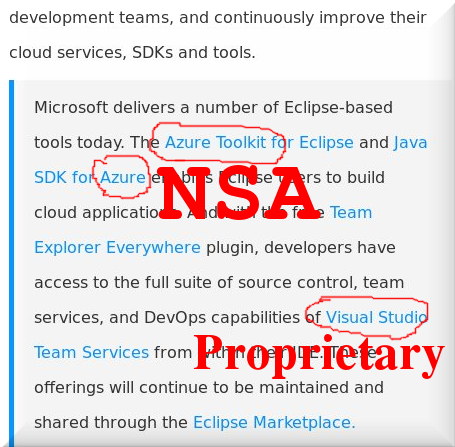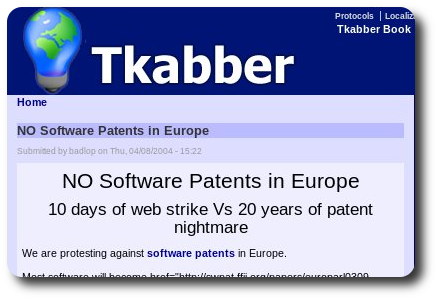03.08.16
Posted in Free/Libre Software, Microsoft at 12:01 pm by Dr. Roy Schestowitz
“Embrace, extend, extinguish” (EEE) is what they call it…

EEEclipse?
Summary: Microsoft is spreading proprietary software and surveillance, extorting Linux with software patents and also contaminating FOSS frameworks, all in less than a single day
LESS than a day after the latest "loves Linux" nonsense we begin to see puff pieces, e.g. [1, 2, 3], which seem more like Microsoft advertisements than actual journalism. No critical thinking, no background/research, no fact-checking. Nothing. Just parroting Microsoft’s marketing/propaganda.
“Microsoft today announced that it is joining the Eclipse Foundation,” one ‘journalist’ wrote, “the open source group that’s probably best known for its Eclipse IDE, but which also offers a number of other developer tools.”
This is “embrace, extend, extinguish,” for reasons we already explained in the following past articles:
Eclipse is actually against software patents, which Microsoft uses against Linux even this week. What was the leadership of Eclipse thinking here? That Microsoft has changed? That there’s a ‘new’ Microsoft? No such thing, it’s all marketing/reputation laundering. █
“I would love to see all open source innovation happen on top of Windows.”
–Steve Ballmer, Microsoft CEO
Permalink
 Send this to a friend
Send this to a friend
Posted in Europe, Patents at 10:47 am by Dr. Roy Schestowitz

Summary: Software patents in Europe have become an issue so serious that some companies now consider the European Patent Office (EPO) more friendly towards software patents than their country of origin (US/USPTO)
OUR core concern (and original concern) about the EPO was its growing lenience on and friendliness towards software patents, contrary to the EPC (on the basis of which the EPO exists). A patent system without quality control/assurance is bound to collapse, devaluing all the patents it ever granted.
According to this new post from IP Kat, “Dennis Crouch, in a post titled “US Patent Applicants Heading to the EPO,” notes that many practitioners believe that the EPO is less restrictive in its application of patent eligible subject matter than the USPTO. [Is that the beginning of a new myth? What do you think?] Interestingly, he also notes that recent data from the EPO supports that belief and that the Unified Patent Court will only make those EPO patents more valuable. Others have said it, but will the UPC be a troll friendly zone?”
The UPC means an open door to yet more software patents, more patent trolls, and more litigation. Good for patent lawyers, trolls, and non-European corporations, that’s for sure. In the comments section a regular reader wrote the following response:
Mike you ask what we the readers think, on the issue whether the EPO is more permissive on patent eligibility than the USPTO.
Well, given that the EPC, Art 52, is more restrictive on eligibility than Section 101 of the US patent statute, it certainly would be interesting, if it were indeed the case. Me, I am sceptical that Europe really is more permissive on business method eligibility than the USA.
Mike, I suggest to you and other readers that an important factor in the USPTO’s current strictness on eligibility is nervousness about the consequences of letting claims through to issue. Owners of issued US patents can use them to intimidate accused infringers in ways not known in Europe. That’s because of the notion in the USA that it has a “strong” patent system which deters folks from infringing. If you choose to operate within the ambit of a duly issued claim, you are “betting the farm” ie putting your entire business at risk. The US patent system is one in which there is a high presumption that issued patents are valid and enforeceable, and that wilful infringement can be punished by triple damages.
Whereas in Europe there is far less fear of infringing.
In Europe, nobody gives any deference to the work of the EPO. A patent owner has to prove the fact of infringement and the infringer has only to get to a “more likely than not” standard of proof to blow away the asserted claim. That being the case, the EPO can take a relatively relaxed view on eligibility/patentability, and let 50:50 claims through to issue, to give the striving Inventor his or her “day in court”.
Readers, keep in mind that the filtering the USPTO does on “eligibility” the EPO chooses not to do under Art 52 EPC. The strongest filtering is left at the EPO till we get to obviousness under Art 56 EPC. No other Patent Office in the world confines itself to technological obviousness, or has a “technological arts” test for obviousness. That’s how it can filter out business methods under the obviousness filter. Nobody else has the “Problem and Solution Approach” so everybody else (including the USPTO) has to do the difficult filtering under the “eligibility” section of its Statute.
It is troubling to see that a professor such as Crouch, whose knowledge in this area is beyond doubt (it’s what he does for a living), believes that the perception of the EPO under Battistelli is this bad. It’s perhaps widely perceived to be a software patents-friendly zone now. When Marshall Phelps worked for patent aggressor Microsoft he said the the EPO “can’t distinguish between hardware and software so the patents get issued anyway” (pretty damning if true).
In the mean time, one of our readers is assessing the stance on software patents as it relates to the only person who (so far) is rumoured to be Battistelli’s replacement (Christoph Ernst). Germany is known to be more software patents-friendly than most of Europe, but this doesn’t necessarily mean that Ernst would misinterpret the EPC in the same way that Brimelow and Battistelli did. Here is what this reader wrote to us this afternoon:
It’s hard to find much of anything. That which is found is neutral, political in wording. He’s mentioned several times in these annual reports, but no detail:
http://www.dpma.de/docs/service/veroeffentlichungen/jahresberichte_en/dpma-annualreport2011_barrierefrei.pdf
http://www.dpma.de/docs/service/veroeffentlichungen/jahresberichte_en/dpma_annualreport2013.pdf
http://www.dpma.de/docs/presse/jahresberichte/dpma_annualreport2014.pdf
Either he’s not in the 2015 report or there is no such report ready yet.
This one appears to be him also, but I am not able to wade through it:
http://eureka.sbs.ox.ac.uk/4509/1/WP1301.pdf
It did also have an alternate spelling of his name in addition to the common spelling.
http://ftp.zew.de/pub/zew-docs/dp/dp11024.pdf
I’ve skimmed a few more from other authors but, again, can’t wade through them. Though I might be misinterpreting it looks like there is a large pool of people who wish to interpret number of resulting patents with ‘quality’ of research.
It is of couse perfectly reasonable to believe that Ernst is just one among several who will be considered as Battistelli’s replacement. It’s also plausible that the rumours are false and that he is not at all being considered for this job. █
Permalink
 Send this to a friend
Send this to a friend
Posted in GNU/Linux, Google, Microsoft, Patents at 10:04 am by Dr. Roy Schestowitz

Summary: Microsoft is still killing (free) Linux with software patents whilst at the same time telling the media that it “loves Linux”
THIS morning we wrote about Microsoft layoffs and an effort to engulf GNU/Linux with proprietary Microsoft software. The PR/charm offensive from last night hasn’t even had much time to cool down and here is another puff piece from the Microsoft-occupied BBC (many Microsoft UK executives became managers there). Hours later we discovered that Microsoft’s hatred of Linux is still bragged about. As this new article by Bogdan Popa put it, Microsoft’s patent extortion of Linux is to net “$3 billion every years without moving a single finger,” or, to quote the summary in full: “Microsoft has just announced that it reached an agreement with Wistron to renew their Android patent licensing agreement, so the company can continue using Redmond’s technology on its tablets, smartphones, e-readers and other devices powered by Android or Chrome OS.”
“This is technically called patent stacking and it artificially elevates the price of devices with Linux on them, for the personal financial gain of Bill Gates and his growing patent network.”Wistron was not only extorted by Microsoft (over patents) but also by Microsoft's troll, Intellectual Ventures, which we wrote about yesterday. This is technically called patent stacking and it artificially elevates the price of devices with Linux on them, for the personal financial gain of Bill Gates and his growing patent network.
Yes, the 'new' Microsoft. Does anyone still believe this sordid myth? The company wants to blackmail companies which use Linux (like it did Acer last month) whilst insisting that it “loves Linux”. Microsoft is just provoking or trolling the GNU/Linux community with pictures that have a heart symbol in them. Corporate media is foolishly reposting these tongue-in-cheekish images. When did basic fact-checking cease to matter? █
Permalink
 Send this to a friend
Send this to a friend
Posted in Europe, Patents at 8:16 am by Dr. Roy Schestowitz
 Summary: A deeper look at Battistelli’s succession (or contrast), which is rumoured to be Christoph Ernst from Germany
Summary: A deeper look at Battistelli’s succession (or contrast), which is rumoured to be Christoph Ernst from Germany
A number of readers of ours have been searching the Web for clues regarding Ernst’s stance on software patents but were not successful. There’s not much information about him in English and not even in German. It was reported that German delegates to the Administrative Council, based on what we learned back in December, had expressed concerns about Battistelli. That would probably have to include Ernst, who is rumoured (based on German media) to be the person who’s going to replace Battistelli.
“Will that be enough to convince delegates (Administrative Council) to vote against Battistelli?”An injunctions-friendly* UPC would go a long way in supporting software patents and we do know that Ernst previously worked towards the previous incarnations of the UPC. Here we have a longtime proponent of software patents and UPC doing it again. No word from this UPC booster (who profits from it in her recently renamed/rebranded employer) about the antidemocratic nature of the UPC or its many downsides, just the borrowing of the UK-IPO’s name to make it seem like an imminent reality (it’s the self-fulfilling prophecy tactics). Public input is currently an obstacle to the UPC, so the lawyers who conspire or collude to make it a reality behind closed doors pretend it’s not needed. The public, in their view, is just a negligible nuisance. Battistelli has been acting the same way when it comes to the UPC, which is far from a reality. Spain is probably the biggest barrier to the UPC and it needs sufficient access to real information in Spanish (not PR/lies from Battistelli and his FTI Consulting-funded UPC propagandists).
Speaking of propaganda, the EPO has just sunk some propaganda into British sites too**, probably serving to distract from reports such as “Deutsches Arbeitsrecht gilt hier nicht”. As SUEPO put it yesterday: “The audio report is close to the report made by the Bayerischer Rundfunk on TV on 2 March 2016.”
SUEPO also publicly shared the videos from Bayerischer Rundfunk some time yesterday (around lunchtime). “On 2 March 2016,” it wrote, “the Bayerischer Rundfunk broadcast a 18-minutes report (from 12’25”) about the EPO. A similar report was broadcast via the radio (Deutschlandfunk; audio is available here) on Sunday 6 March 2016. Subtitles in English are provided.”
This came out in time for the vote on strike action. Will that be enough to convince delegates (Administrative Council) to vote against Battistelli? Or is there still overwhelming fear of retribution? Is Kongstad on Battistelli’s “naughty” (perceived enemies) list now, due to the letter he drafted? At the end of next week the EPO’s staff will almost definitely go on strike and the Administrative Council should defend Kongstad, not the psychopath Battistelli. When Battistelli told Dutch media last week that his "relationships are excellent" he was probably thinking of Bergot and her husband, who is loyal to Battistelli. It’s all one big happy family at the top [1, 2, 3, 4] (Team Battistelli), but the Administrative Council quickly reaches the verge of divorce. █
___
* MIP has this new report about EPO and injuctions, noting that “The Athens Single Member Court of First Instance recently granted a preliminary injunction based on a patent despite the fact that the Opposition Division of the EPO, a few days before the preliminary injunction hearing, had revoked the same patent.”
** MIP also has this new report about Battistelli and his new allies in Tunisia, as “[v]alidation of European patents in Tunisia will soon become a reality,” making all sorts of jokes possible about Ben Ali Battistelli and other tyrants.
Permalink
 Send this to a friend
Send this to a friend
Posted in Apple, Patents, Samsung at 7:40 am by Dr. Roy Schestowitz
For the time being, only patent lawyers make a lot of money in the process and the public is paying for it

Summary: A look at recent news about Apple and its patent cases, which the company is trying to escalate up to SCOTUS, as is Samsung (depending on the case)
THE reality of patents is more complex than patent lawyers (and other patent maximalists) typically put it. Injunctions are never beneficial to the population (whether one calls them “customers” or uses the more derogatory word, “consumers”) and the costs of products are artificially elevated to make up for lawyers' fees.
“Apple wants not only its own phones to cost nearly a thousand bucks.”Alluding to this patent case against Apple, Patently-O writes that: “It will be interesting to See how Apple responds. The court asked for responses from Apple, Mangrove, and Director Lee to be filed next week.”
“This isn’t just a US problem by the way.”In another case, one in which Apple is a patent aggressor, the judge “issues a warning to Apple lawyers,” according to this recent report about Apple’s fight against Samsung (SCOTUS intervention may be next). Well, only the lawyers win in this case (or war), which has gone on for 6 years. Apple wants not only its own phones to cost nearly a thousand bucks. Along with Microsoft, the Microsoft-dominated (hijacked) Nokia and CPTN partners like Microsoft and Oracle, Apple tries to make Android equally expensive, using software patents for the most part.
This isn’t just a US problem by the way. The EPO‘s President (for now) Battistelli is clueless about the Office's operations and role in the Apple litigation. This cannot be seen as acceptable. █
Permalink
 Send this to a friend
Send this to a friend
Posted in America, Patents at 7:09 am by Dr. Roy Schestowitz
Sanity fights its way back into a system which is dominated by large corporations and trolls-leaning ‘think tanks’

The above [1, 2, 3, 4] are symptoms of a much broader and systemic problem
Summary: The US Federal Circuit (initiator of software patents), or “CAFC” as it’s commonly referred to, gets increasingly involved in patent cases and spreads its bias on such matters in ways that even patent professionals find dubious
“The data released from the USPTO in its annual report shades the truth somewhat,” wrote Patently-O yesterday. “but includes a number of important signals.”
“The Federal Circuit may as well just become synonymous with or renamed to Federal Patent Court.”The EPO‘s report also shaded the truth. That’s what these self-serving (and not independent) reports do. In the case of the USPTO — as is increasingly the case under Battistelli at the EPO — only numbers count, not quality. The integrity of the processes (notably examination) is severely compromised in the name of short-term monetary gains. This is not acceptable.
Another new article from Patently-O says that “the Court of Appeals for the Federal Circuit (“CAFC”) hears patent appeals, but some readers may be surprised when told that the CAFC also hears, inter alia, appeals from the Court of Appeals for Veterans Claims (“CAVC”).”
Techrights spent years writing about the Federal Circuit, which is rife with corruption and patent maximalism, including software patents which originally came about from there. Anything that gives CAFC even more power would put at risk the entire system. Patently-O says that the “Federal Circuit Now Receiving More Appeals Arising from the PTO than the District Courts”. It’s all about patent feuds now. Good for patent lawyers, not for anybody else except their biggest clients (large corporations). “Appeals arising from district court patent infringement cases,” wrote Patently-O, “have historically made up about a third of the court’s docket. In 2011, for example, appeals from the district courts constituted 33% of appeals filed, while appeals from the PTO were about 9%.”
The Federal Circuit may as well just become synonymous with or renamed to Federal Patent Court. Here is a patent lawyer (from Troutman Sanders) writing about CAFC, bemoaning the Patent Trial and Appeal Board (PTAB), as usual, as PTAB helps crush software patents. To quote one paragraph, “Judge Newman wrote in dissent that the PTAB’s interpretation runs afoul of the AIA’s intent to create an efficient alternative forum for resolving patent disputes, since a failure to resolve all claims before the PTAB leads to duplication in district court.”
Actually, the district courts would not be needed if the USPTO properly did its job in the post-Alice era and PTAB completed the job by throwing in the trash invalid (e.g. abstract) patents that the USPTO erroneous of fraudulently (for personal gain) granted. Years ago we noted that the USPTO had been giving financial incentives to accept patent applications rather than reject/decline them. What kind of system is that? Is there any illusion left of objectivity?
MIP, another patent maximalism site, wrote yesterday about “PTAB issues to watch in 2016″. It said that the “Patent Trial and Appeal Board is taking a harder line on institution, while PTAB watchers eagerly await a face-off at the Supreme Court over claim construction and the Federal Circuit increasingly pulls the Board up on procedural issues” (SCOTUS has already issued its judgment on that in the Alice case).
Writing about CAFC, Patently-O says that “In a split decision [it] has again rejected a jury verdict” (so much for justice). “Here,” said the author, “the alleged infringing meters are designed to be bolted down to exterior walls and left in place for years. Of course, it is fairly easy for an electrician to move these meters and install them, but they are designed to operate in a fixed location once installed. The majority ruled that the best (and only reasonable) construction of the term involves both of these requirements (portability and non-permanent location).”
“Decades after CAFC brought all sorts of ludicrous patents to the US (notably software patents) they seem to be fading or ebbing away.”Another new Patently-O post by Dennis Crouch says: “In an interesting and important mandamus ruling, the Federal Circuit has ordered the district court to withdraw its order compelling discovery of communications with non-attorney patent agents.”
The Federal Circuit sure isn’t doing much to improve its image. It engages not only in its own turf wars but also others’. Consider some belated comments on the recent Lexmark case (EN | ES) that appear in patent maximalism blogs [1, 2]. It increasingly seems like CAFC is so biased that it merely works for corporations, not for justice.
“US courts have become much more defendant friendly,” wrote a software patents proponent yesterday, “district courts routinely find against plaintiffs asserting patents – particularly NPEs [patent trolls] – and if they don’t the Federal Circuit (CAFC) often overturns district court judgments.”
This patent maximalist, Joff Wild, basically bemoans courts which don’t support software patents (the trolls’ favourite weapon) and he adds: “Specific decisions from the Supreme Court – Alice, Myriad and Mayo, for example – have had a direct impact on patentability in areas such as software, biotech and business methods.”
This is of course a good thing. Decades after CAFC brought all sorts of ludicrous patents to the US (notably software patents) they seem to be fading or ebbing away. Patent maximalists (which include patent lawyers) won’t tolerate this defeat. Neither will CAFC. █
Permalink
 Send this to a friend
Send this to a friend
Posted in Europe, Patents at 6:19 am by Dr. Roy Schestowitz
Striving to put an end to psychopathic management

Summary: Staff of the EPO refuses to be governed by fear (hence the animation of Jack Nicholson in “The Shining” above) and decides to vote for a strike
THE management of the EPO has abused staff so badly that soon there will be a strike. Based on our information, a high proportion of EPO workers will be brave enough to vote today for a strike. At the end or next week the Council will probably tell Battistelli to leave. To twist Battistelli's words against him, “An Earthquake Would be Needed for the Administrative Council… To Let Him Stay.”
Looking though some comments from last night, people recall how Battistelli ignored the disciplinary committees and then lied to his staff about it:
The disciplinary committee did not recommend dismissal for Ion Brumme because he has five children – one is just a baby – and a loan to pay on his house. ONLY Batistelli took this cruel decision to dismiss him. I do not understand a person still having ANY confidence in Battistelli. I see NOTHING positive in him. Continuing with him is the end of the EPO and a lot of problems for the people working there. There is only one vote: STRIKE. To all EPO staff – PLEASE VOTE ON TUESDAY for STRIKE!!!
Battistelli is cruel and insane. A dangerous cocktail, to twist his own words again (reference to this interview from December).
Someone called today “Super Tuesday” as part of the following little poem:
S uper Tuesday,tick the box
T hen,bless his little cotton socks
R uler Supreme will have another nail
I n his Presidential coffin,epic fail
K ick him out!Our French cockerel
E mancipate long-suffering Eponians from this doggerel
The following comment is very much correct, as it suggests that now is the time for FFPE EPO to prove that it’s not just a spineless courier of Battistelli:
I would welcome if the FFPE-EPO could also mobilise some support from Brussels and walk side by side with EPO staff during the upcoming strikes! Thereby giving Europe and its institutions hope through united trade unions against abuse of human rights, injustice and declining democratic principles.
People still feel hurt by FFPE EPO and it remains to be seen if FFPE EPO follows the suggestions to join the strike and openly encourage members to vote for it. To quote another comment:
What kind of deals should staff actually expect from a union which signs an agreement with a person of which they know that he lied to his “superior” (eg BoA reform documents), lied to the public (eg reports on majority of staff supporting his actions), protects highly suspecious people (eg see trials in Croatia), promotes nepotism (have a look at the “inner circle” map of Suepo), enjoys revenge on the weak (eg more severe punishments than proposed by the disciplinary commitee; press campaign against BoA member) … where the union takes one hand, knowing that the second has the knife to backstab at any convenient moment.
What powers does such an union have, where any non-pleasing movement may be rewarded with the investigative unit … why should staff have confidence in such a union ..? Why should anybody expect them to work in staff’s interest?
The EPO will not issue a single statement about the vote for protest. The management pretends (e.g. to the media) that no strike action is going to take place by speaking hypothetically about last year rather than this month (we covered this last week) and today the EPO’s PR department is piggybacking International Womens’ Day for cheap PR. █
Permalink
 Send this to a friend
Send this to a friend
Posted in GNU/Linux, Microsoft at 5:48 am by Dr. Roy Schestowitz
“MSFT deploys tech to help govs spy” –Christopher Soghoian, Principal Technologist at ACLU, February 26th, 2016

Summary: The misguided and direction-less company from Redmond is hoping that enough people out there are foolish enough to believe that Microsoft “loves Linux” and will therefore help Microsoft abduct GNU/Linux by putting insecure proprietary software in it
Microsoft layoffs have been accelerating even though the company does a decent job hiding it (our sources inside Microsoft are surprised that the company is unable to keep it secret).
Based on this report, having already shut down some of its gaming studios (firing all the staff) and now that it’s alienating outside studios [1-4], the company is preparing to toss Lionhead Studios in the trash. One of its developers, who had worked there even before the Microsoft takeover, used to be a regular in our IRC channels. To quote one of the reports about it: “The game publisher and hardware maker announced today that it is canceling Fable Legends, the next installment in the fantasy series that has been an Xbox staple since its debut in 2004. Microsoft also said that it has proposed completely closing Fable developer Lionhead Studios. This could mark the end of one of the most iconic developers in the $99.3 billion global game industry (based on market researcher Newzoo’s estimates).”
“Microsoft is basically a dying company.”Suffice to say, Microsoft is not doing well. Vista 10 has been such a disaster that the company now forces people to install it and turns the screensaver/lockscreen into ad space (we didn’t find time to cover this because of the EPO emergency). Moreover, as last night’s news serves to show, Microsoft is trying to stay relevant by putting its tentacles on GNU/Linux. We already put two dozen SQL Server links in our last night’s daily links (and in Tux Machines under the title “Microsoft Proprietary Software Spreads”). This has been covered by GNU/Linux proponents [1, 2, 3, 4], Microsoft boosters, and of course some news sites that carry water for Microsoft, promotional banners with the heart symbol included [1, 2]. They don’t try to understand for themselves what’s going on here and instead do an ‘easy’ job by just parroting Microsoft.
Microsoft is basically a dying company. Buying back one’s shares only gives the illusion that it’s business as usual. Windows as a franchise is dying. Don’t let it turn GNU/Linux into a proprietary software platform with NSA back doors (remember it was Microsoft that kick-started PRISM with the NSA). █
Related/contextual items from the news:
-
In my view, this is the most aggressive move Microsoft has ever made. While the company has been convicted of violating antitrust law in the past, its wrongful actions were limited to fights with specific competitors and contracts with certain PC manufacturers.
-
In a scathing editorial in The Guardian, Epic Games cofounder Tim Sweeney spoke out about Microsoft’s Universal Windows Platform (UWP) initiative, calling it a “fiasco” and “the most aggressive move Microsoft has ever made.”
“With its new Universal Windows Platform (UWP) initiative, Microsoft has built a closed platform-within-a-platform into Windows 10, as the first apparent step towards locking down the consumer PC ecosystem,” said Sweeney. “Microsoft has launched new PC Windows features exclusively in UWP and is effectively telling developers you can use these Windows features only if you submit to the control of our locked-down UWP ecosystem.”
-
-
GAMING VETERAN Tim Sweeney, co-founder of Epic Games, which gave the world the Unreal Engine and games like Gears of War, is worried that Microsoft will ruin the games industry if the firm is allowed to continue its closed platform proposition.
Sweeney was given room to write about this in The Guardian (Tim, if you’re reading this you can come to us first next time) and made the most of the noises from Microsoft about bringing console and PC gaming closer together.
“With its new Universal Windows Platform initiative, Microsoft has built a closed platform within a platform in Windows 10 as the first apparent step towards locking down the consumer PC ecosystem and monopolising app distribution and commerce,” he wrote.
Permalink
 Send this to a friend
Send this to a friend
« Previous Page — « Previous entries « Previous Page · Next Page » Next entries » — Next Page »




 Summary: A deeper look at Battistelli’s succession (or contrast), which is rumoured to be Christoph Ernst from Germany
Summary: A deeper look at Battistelli’s succession (or contrast), which is rumoured to be Christoph Ernst from Germany



















 Content is available under CC-BY-SA
Content is available under CC-BY-SA